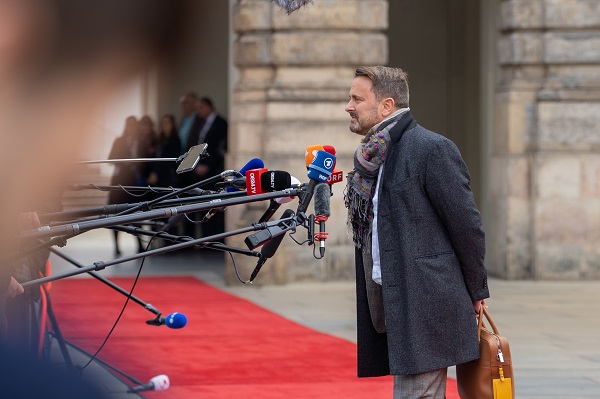 Luxembourg's Prime Minister Xavier Bettel in Prague;
Credit: Czech Presidency of the Council of the EU
Luxembourg's Prime Minister Xavier Bettel in Prague;
Credit: Czech Presidency of the Council of the EU
From Thursday 6 to Friday 7 October 2022, Luxembourg's Prime Minister, Xavier Bettel, travelled to Prague in the Czech Republic to represent Luxembourg at the first meeting of the European Political Community as well as at the informal meeting of heads of state and government of the European Union (EU).
Prime Minister Xavier Bettel notably took part in the "Peace and Security" round table as part of the exchanges at the first meeting of the European Political Community on Thursday. He reminded his interlocutors of the need for a united approach to the war in Ukraine and its devastating global implications.
On the sidelines of this meeting, the Prime Minister and his Benelux counterparts held discussions with other European counterparts on common challenges. With this in mind, he met Ukraine's Prime Minister Denys Shmyhal and reminded him of Luxembourg's support and solidarity for the Ukrainian people as well as for the sovereignty and territorial integrity of Ukraine. Prime Minister Xavier Bettel also met, once again together with the Netherlands' Prime Minister Mark Rutte and Belgium's Prime Minister Alexander de Croo, the President of the Republic of Moldova, Maia Sandu. They discussed the challenges faced by Moldova in the context of the security situation in the region.
Luxembourg's Prime Minister also spoke bilaterally with his Slovenian counterpart, Prime Minister Robert Golob, Finnish Prime Minister Sanna Marin and Slovakia's Prime Minister Eduard Heger.
During the informal meeting of EU heads of state and government on Friday, Prime Minister Xavier Bettel highlighted the importance that the EU must attach to energy autonomy, security of energy supply and good functioning of the internal market and cross-border energy flows. He also expressed Luxembourg's support for a price cap on all gas imports. At the same time, he reaffirmed the need to reduce European dependence on all fossil fuels and to promote renewable energies in order to achieve the climate objectives set out in the Paris Agreement. Finally, he emphasised the obligation to protect critical infrastructures on European territory.








